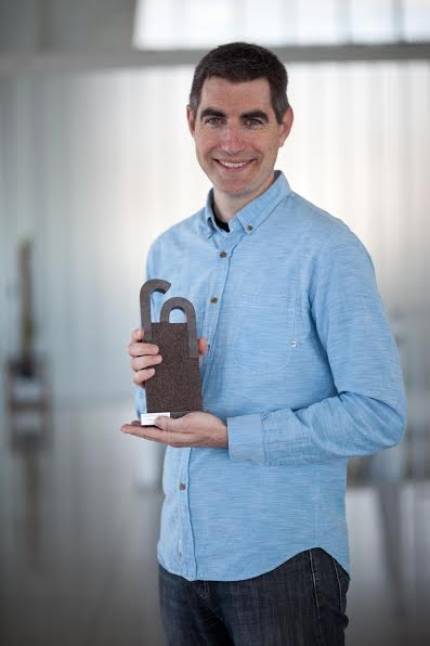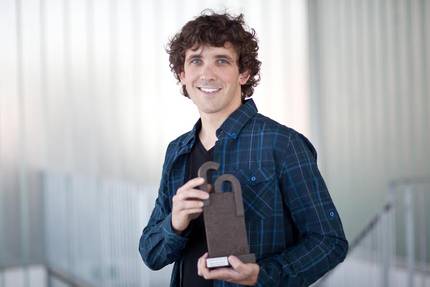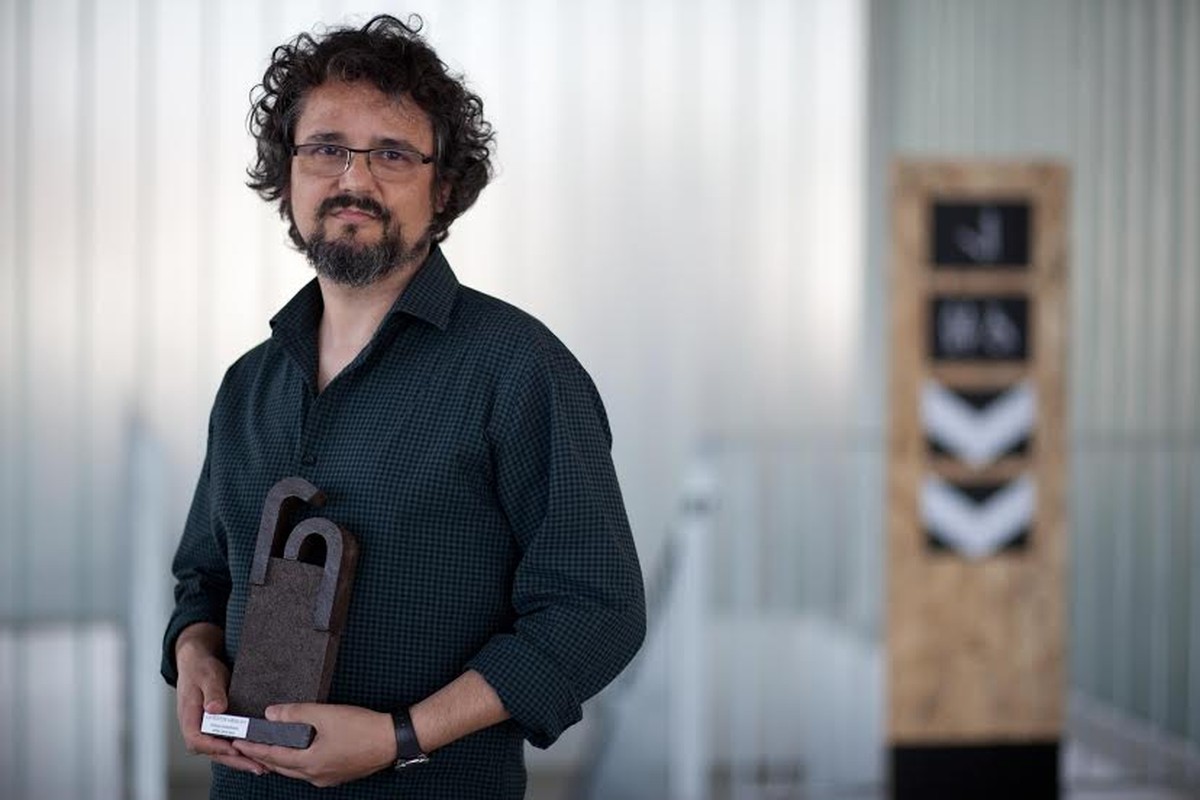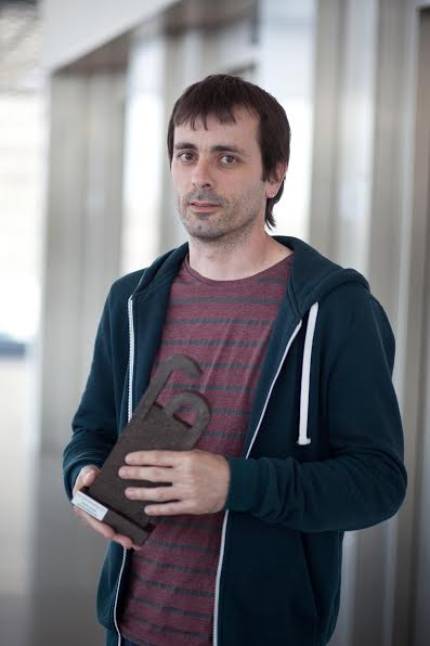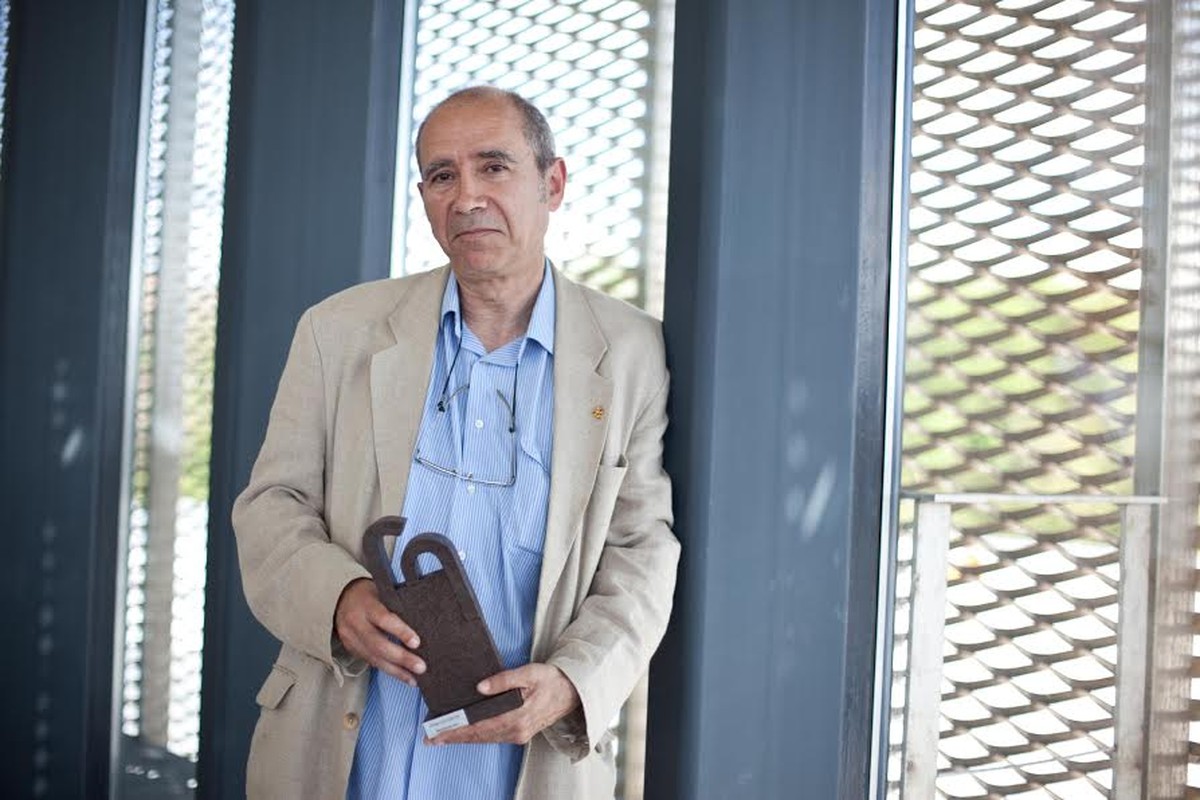Today the CAF-Elhuyar awards of this year have been presented in Tabakalera
2016/05/11 Agirre Ruiz de Arkaute, Aitziber - Elhuyar Zientzia Iturria: Elhuyar aldizkaria
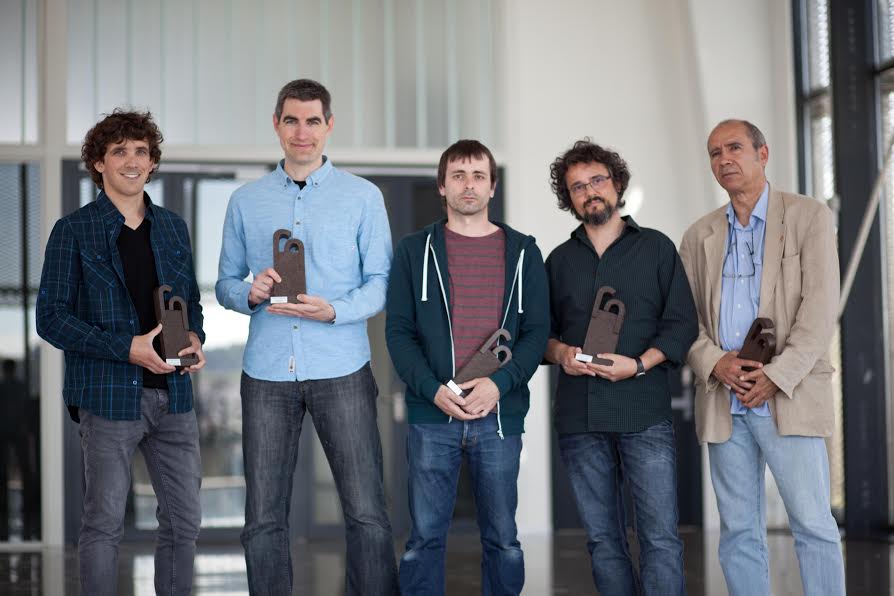
The CAF-Elhuyar awards were presented in Tabakalera. The winners were engineer Xabier Artaetxebarria Artieda, biologist Antton Alberdi Estibaritz, journalist Edu Lartzaguren Urdangarin and researcher Enrique Hurtado Mendieta. The prize has been awarded to zoologist Kepa Altonaga Sustatxa.
Tabakalera has been a meeting place for scientists, journalists and disseminators. Within the framework of the International Centre for Contemporary Culture, the CAF-Elhuyar awards wanted to highlight that scientific culture is also part of culture.
The winners were:
Award for best general disclosure article: “Why are we good?”, Xabier Artaetxebarria Artieda.
Prize for articles based on the author's thesis: “Non hegoa, han hanga: following the trail of the alpine orejón bat”, Antton Alberdi Estibaritz.
Journalism Award: Report on the cloning “Cow and Return” by Edu Lartzaguren Urdangarin.
Grant of creation in scientific society: Project “Txalaparta digital y interactiva”, by Enrique Hurtado Mendieta.
Elhuyar Award: Kepa Altonaga Sustatxa corresponding biologist and academic. We wanted to recognize the great work done in the normalization and socialization of Basque.
Why are we good?
The San Sebastian telecommunications engineer Xabier Artaetxebarria Artieda has received the award for the best general disclosure article. Reflect on altruism. Altruistic behavior manifests itself among individuals of the same species, as well as among different species, but it has also been said to go against natural selection. Artaetxebarria recalled in his article the controversies that exist between scientists to clarify which evolutionary processes affect above all the origin of altruism.
According to the jury, the theme chosen by the author is attractive to all, and thanks to its clear writing and rich language, has managed to create a pleasant article. He has been able to adequately shape the reasons for both sides to illustrate the debate on the subject.
Artaetxebarria recalls the first time he heard altruism collecting the prize. “Seven years ago I won this same award with another article and was invited to give a lecture in the EU. There I met a UPV professor, Arturo Elosegi, and he spoke to me for the first time about Richard Dawkins, one of the protagonists of the article. In addition, with an altruistic action, after a few days he sent me home a book written by him, which was the winner of the 1st edition of the CAF-Elhuyar awards: Sex as an engine of evolution. In one chapter he spoke of the origin of altruism. 7 years ago I didn’t have the opportunity to thank Arturo and now I want to thank that altruistic action.”
Non hegoa, there the leg
Elgoibar biologist Antton Alberdi Estibaritz has been awarded the prize for articles based on the thesis “Non hegoa, han han han zangoa: saguzar belarrihandi alpino following the footprint”.
This is what Alberdi says in his work: “We would like to fly, breathe underwater, see it in the dark, not go cold… but we can’t. In nature, the desires and dreams of each have limits and all living beings live within certain limits. But that is why we can enjoy the biodiversity of our environment, because each of the living beings fulfills its space, its ecological niche, in the immensity of the natural conditions. Knowing the ecological niches of living beings is one of the pillars of biology.” Alberdi has completed his doctoral thesis on the ecology and evolution of the alpine orejero bat.
The jury has stated that the work presented to the awards is perfectly written, clearly explaining the most technical aspects, despite its complexity. The image attached has also been of great help and utility to convey information in an understandable and attractive way. Finally, he comments very well on the contribution of his research to the subject.
Alberdi takes advantage of the event to claim changes in research scholarship regulations. In his opinion, his partner, biologist Ostaizka Aizpurua, had to ask to modify the date of the interview of a research grant requested from the Basque Government when she was pregnant, since in principle it was precisely that day when she left. His response was negative. Both are in Denmark with another scholarship. Requests that the regulations be amended for the next call so that it does not happen again.
“I think research and scientific outreach are inseparable,” adds Alberdi. For this reason, it has requested that in the calls for grants the work done by researchers in the dissemination is valued. And that, as far as possible, they allocate researchers to make disclosure, “so that we all feel that disclosure is part of the research.”
Cow and turn
Journalist Edu Lartzaguren Urdangarin has received the Journalism Award thanks to the report on the cloning “Vaca y Berriz” published in the newspaper Berria.
Thus the article Lartzaguren has begun: “In China they want to pass cloning from the laboratory to the factory and become a conventional industrial process. By 2020 they want to produce annually one million cloned cows. With other animals they will form the chain of production and everything is ready for international society, when it is close, to incorporate man into the catalogue.”
According to the jury, he addressed the issue from an original point of view, focusing it from a pragmatic economic point of view. The report is completed with expert interviews, which increases the value of work. On the other hand, it has used a light and easy-to-read tone and rich language. The reader joins the title.
Lartzaguren said this when he receives the prize: “Cloning is not a matter of the future. It is already very common. All systems are prepared to clone man. Science seems fiction, but now everything is ready to do it. They have not yet cloned a human being because the world is not philosophically or ethically prepared. Despite being technically prepared, researchers fear an adverse reaction. But it will be done… when you find a good reason to do it.”
Digital and interactive txalaparta
The media are not the only way to socialize science. This is demonstrated by the projects in the category of creation grants in science society. This year the project “Txalaparta digital y interactiva” presented by Enrique Hurtado Mendieta has been the winner. He has completed his doctoral thesis in the Department of Art and Technology of the UPV/EHU, with the aim of researching txalaparta from the point of view of music that is created by computer.
The jury considers that the project presented is elaborated, well defined and feasible. Based on txalaparta, it is a known instrument that can arouse interest in many people, not only among txalapartaris, but also in other areas. On the other hand, the use of free technology contributes significantly to socialization, so in this sense, it also fully conforms to the objectives and criteria of the scholarship. Finally, it should be noted that the author of the project has come to tradition from technology, while using technology to put it in the path of the future.
“With this scholarship I would like to expand more the research done in the doctoral thesis among the txalapartaris. There are many people who have worked in the txalaparta, and it’s attractive to people in general.”
Elhuyar Award of Merit
The Prize is awarded by the Board of the Elhuyar Foundation. This year's one was received by the Biscayan biologist Kepa Altonaga Sustatxa, who wanted to recognize his work in the normalization of Basque and in the socialization of science.
Born in Loiu, Altonaga graduated in Biology in 1980 and soon after joined the Faculty of Sciences as a professor at the University of the Basque Country. In the field of research, for many years he has analyzed the adventures and snails. A member of the Basque Summer University and director from 1992 to 1995, he was appointed a corresponding academic in 2003.
Kepa also knows the CAF-Elhuyar awards well, which has often been awarded. He has been awarded the 1996, 1999 and 2003 Outreach Book Award on three occasions, resulting from the following essays: Marquis of Folin: rodents and Basques on the lost island, Armand David, father of panda and doctor of Etxepare Aldude. He has also written other attempts such as: Darwin (published in 2010 and awarded the Juan Zelaia Award) or Back to Leizarraga (published in 2015).
Kepa's production, besides scientific, is therefore literary, large and of high quality. The Board of Trustees of the Elhuyar Foundation has awarded the CAF-Elhuyar de Méritos Award 2015 for essays, works and articles written by Altonaga throughout his professional career, for his rigor and contribution to the field of Basque.
Altonaga has received the award with a lot of humor. “I am very satisfied, seeing that my work is appreciated. But when I heard about the prize I have to say that I stayed a bit long, thinking that I am young. But it served to become aware of the time elapsed between two and three days.”
Looking back, he accepted that for him it was a school. “There I found a suitable humus to grow, to breathe the right atmosphere.” However, he took the opportunity to reflect on the Basque language used by Elhuyar: “I think domestic flights are fine, and with the language model we have achieved for that, we can be comfortable. But I think for those transoceanic flights, we need another paradigm.”
Change of knowledge
Another of the protagonists of the day was the song Izarren zuria. Change of knowledge. At the event they recalled the words of Xabier Lete, with the aim of “changing knowing”, both Elhuyar and the researchers and disseminators gathered there.
The motto of this year's CAF-Elhuyar awards is "Get the vaccine in favor of scientific culture" has been and we have asked the winners of previous years what scientific culture is for them.
After the awards ceremony, the party continues. Attendees had the opportunity to chat with friends and eat a lunch. We will meet again next year!

Gai honi buruzko eduki gehiago
Elhuyarrek garatutako teknologia



